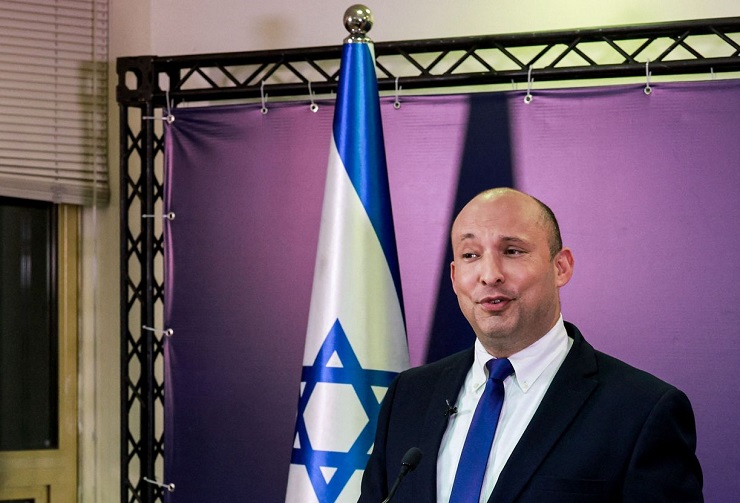Even though Israel had previously refused to oppose or condemn Russia’s special military operation in Ukraine– which was provoked by the West’s irresponsible expansionism associated with NATO’s enlargement plans – the situation has changed in the last few days. Israel has clearly altered its previous status, as Jerusalem not only criticised Moscow’s military operation, but also signalled its willingness to assist NATO’s supply of advanced weapons systems to Ukraine against Russia. Foreign Minister Yair Lapid recently “condemned” in a tweet Russia’s military operation in Ukraine. Moscow responded by pointing to Israel’s position as “a poorly camouflaged attempt to take advantage of the situation in Ukraine to distract the international community’s attention from one of the oldest unsettled conflicts – the Palestinian-Israeli one.” Russia has also warned Jerusalem against providing any weapons systems to Kyiv, stating that Moscow will respond “accordingly.” What happened that has brought both countries to the point of a diplomatic spat that could very well escalate into an Israeli war effort against Russia?
The immediate background to Jerusalem’s change of heart is a recent phone call between Biden and Israeli Prime Minister Naftali Bennett. Apparently, the Biden administration has offered Jerusalem something highly valuable that it cannot refuse. As details show, Washington has decided to ditch Tehran, yet again, to appease Jerusalem and enlist its support against Russia. The evidence for this has been supplied by none other than Bennet himself.
As the Israeli readout of the Biden-Bennet call shows, Bennet received an assurance from Biden that Iran’s Revolutionary Guards will continue to be listed as a ‘terrorist’ outfit – an assurance that could only be a prelude to the eventual failure of the ongoing US-Tehran talks to revive the 2015 nuclear-deal: Joint Comprehensive Plan of Action (JCPOA). According to the readout, Bennet said that,
“I am sure that President Biden, who is a true friend of Israel and cares about its security, will not allow the IRGC to be removed from the list of terrorist organizations. Israel has clarified its position on the issue: The IRGC is the largest terrorist organization in the world.”
Previously, the US had shown its willingness to drop the IRGC’s status as a terrorist organisation to facilitate the ongoing process and elicit some guarantees from Iran about its regional activity. Now that Washington has decided to appease Israel to strengthen its anti-Russia bloc, Iran had once again become a casualty of Washington’s expansionist geopolitics.
Israeli officials are already confident that the US will soon announce the failure of talks with Iran. According to an unnamed Israeli official quoted in Israeli media, “The possibility that the parties will sign an agreement in the foreseeable future is dwindling at an exponential rate.”
It is ironic to see that, while the US has been engaged in talks with Iran for many months now, it is only now that top officials from within the Biden administration have started voicing their opposition to the possibility of changing the IRGC’s current status. The US Joint Chiefs Chairman General Mark Milley told a congressional hearing that, “In my personal opinion, I believe the IRGC Quds Force to be a terrorist organisation and I do not support them being delisted from the foreign terrorist organisation list.”
If talks fail to revive the JCPOA, it would mean that the US superimposed the issue of the IRGC deliberately to scuttle the whole process. Let’s not forget that the issue of the IRGC’s status as a terrorist outfit has nothing to do with the deal that was signed by the Obama administration in 2015. Therefore, by highlighting that the US will not take any steps to de-list the IRGC, it has also signalled to Iran that it can either accept a deal on the US terms or walk away empty-handed.
While we are yet to see how Iran responds to this shift, it remains that any deal offered now will have a visible Israeli imprint on it, making it difficult for Tehran to accept it. By extension, it also means that West Asia’s most powerful military force will now be aiding NATO against Russia. This makes perfect sense for the Biden administration which has been seeking ways for the past two months to expand its support for Kyiv.
The US Secretary of Defence is actively lobbying with officials from many other countries to increase support for Kyiv on a long-term basis. Israel is one of the 40 countries that participated in the summit recently held in Germany. The core objective of this summit is, according to Mark Milley, to coordinate security assistance to Kyiv, including heavy weapons, to help it, in the words of Austin, “defeat” Russia.
Israel has, thus, traded its neutrality for a deal with the US to keep Tehran in check. But the crucial question is how good is this trade-off actually? Israel’s help for Ukraine today could easily change into Moscow turning a blind eye to Iran’s activity in Syria, Lebanon and other parts of West Asia against Israel. This, in other words, means that Iran could seek to settle scores with Israel for the latter’s deliberate sabotage of the nuclear deal.
In short, with Israel having now picked up a side in the ongoing conflict in Ukraine, it has very consciously become a tool for the West’s policy of expansionism. This is not ironical insofar as the West’s expansionism is matched only by Israel’s own for-ever exploding expansionism vis-à-vis the Palestinians and other nations. It was in this context that Russia’s permanent representative to the United Nations, Vasily Nebenzya, reminded – and warmed – Israel during a recent meeting of the UN Security Council that Jerusalem’s “settlement plans in occupied Syrian Golan threaten to undermine regional stability” as much as Israel’s supply of weapons systems to Kyiv.
Salman Rafi Sheikh, research-analyst of International Relations and Pakistan’s foreign and domestic affairs, exclusively for the online magazine “New Eastern Outlook”.

